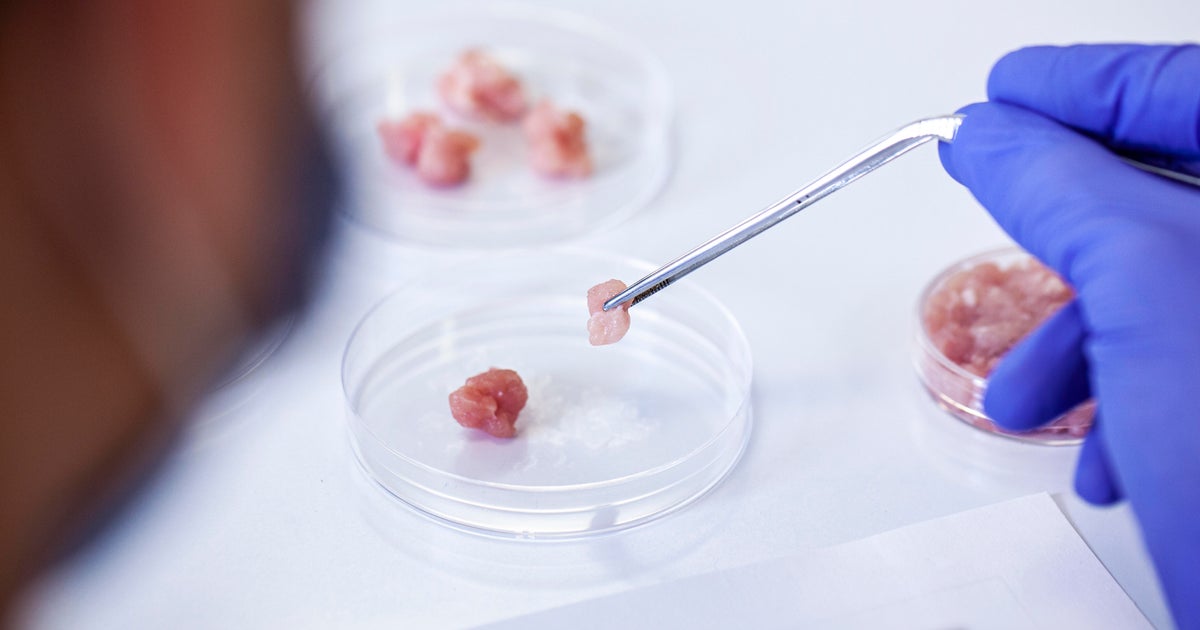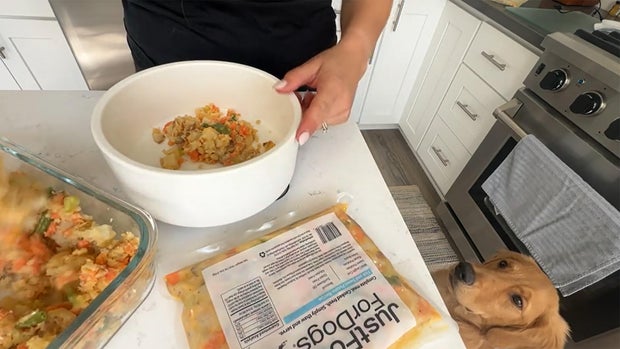CBS News
Alabama follows DeSantis’ lead in banning lab-grown meat

Alabama has became the second U.S. state to say no to cultivated meat, an alternative protein made from animal cells.
The Alabama bill, proposed by Sen. Jack Williams, vice chair of the Senate Agriculture, Conservation, and Forestry Committee, and signed into of law on May 7 by Gov. Kay Ivy, prohibits “the manufacture, sale, or distribution of food products made from cultured animal cells.”
The new law comes a week after Gov. Ron DeSantis made Florida the first state to ban the sale of so-called lab-grown meat. “We stand with agriculture, we stand with the cattle ranchers, we stand with our farmers, because we understand it’s important for the backbone of the state,” DeSantis said in a May 1 press conference, the start of National Beef Month.
“Today, Florida is fighting back against the global elite’s plan to force the world to eat meat grown in a petri dish or bugs to achieve their authoritarian goals,” the DeSantis added.
Sales of beef cattle and breeding stock generate over $900 million per year in the state, according to the Florida Department of Agriculture and Consumer Services.
Beef production is a focal point of climate change discussions as it is a major contributor to global methane emissions. “A single cow produces between 154 to 264 pounds of methane gas per year,” according to the Environmental Protection Agency. Multiply that by the 1.5 billion beef cattle raised worldwide, and you get a total of at least 231 billion pounds of methane expelled yearly into the atmosphere.
By contrast, cell-based protein doesn’t require the land, water and crops needed to raise livestock, a boon for the environment as global demand for meat rises, experts note. Global funding for cultivated meat and seafood companies, of which there are more than 100, reached $225.9 million in in 2023 and a total more that $3 billion since 2013, according to the Good Food Institute.
“Legislation that bans cultivated meat is a reckless move that ignores food safety experts and science, stifles consumer choice, and hinders American innovation,” Sean Edgett, chief legal officer of Upside Foods, said in a statement to CBS MoneyWatch. “Major meat companies have invested in cultivated meat to enhance supply chain resilience and meet rising global demand for meat. We should be embracing innovation for a better food future.”
Upside, one of only two cultivated meat firms to receive clearance by the USDA to sell their chicken products in the U.S., has received investments from food giants Cargill and Tyson Foods as well as billionaires Richard Branson and Bill Gates.
In response to the Alabama and Florida bans, Upside started a change.org petition urging consumers to tell politicians “to stop policing” their dinner plates.
—With reporting from the Associated Press.
CBS News
Rediscovering the Baked Alaska – CBS News

Watch CBS News
Be the first to know
Get browser notifications for breaking news, live events, and exclusive reporting.
CBS News
Serving up home-cooked dog food

In Hollywood, a land known for marquees and famous signs, there’s probably no sign that’s more on the nose than the store Just Food For Dogs. There, four-legged customers sample today’s offerings, while their owners stock up on the food.
Sarah Rector and her French bulldog, Lulu, are buying her regular order, including beef with russet potato, and venison with squash. Rector says she feels better buying the store’s food for Lulu rather than commercial dog food: “I just know that she’s getting the best possible, like, ingredients and health and overall wellness.”
She and her husband don’t have children, yet, but they have another French bulldog, “so I feel like we have kids.”
It’s tempting to write this off as a trendy L.A. fad, but Just Food For Dogs president Carey Tischler says this store is here because of a permanent shift in the roughly $50 billion U.S. pet food industry. “The last year of research shows that 82% of families think of pets as family, or as children, and that’s up significantly,” he said.
CBS News
Joe Ovalle is Just Food’s guest experience manager. He says all of their pet food is approved by the USDA for human consumption. “It is human-grade food, something you and I could eat,” he said.
He sampled one of their recipes, for fish and sweet potato. “Oh my God, it’s like ceviche,” he smiled.
It may seem a bit indulgent, and can cost double the price of Kibbles, but some say that feeding our dogs natural food is what we should have been doing all along – and making it yourself can cost the same as buying food from the store.
“It’s about going back to what is biologically appropriate, that they ate for tens of thousands of years,” said pet nutritionist Christine Filardi. “They ate prey animals and table scraps. So, I’m just educating people on how to go back to what they ate for tens of thousands of years prior to commercial pet food.”
Stewart, Tabori & Chang
Filardi is author of “Home Cooking For Your Dog,” a cookbook offering recipes with what she says are the three necessities: animal protein, a carb, and a veggie, as well as a few extravagant treats, like her bacon and cream cheese muffins.
Filardi says whether it’s store-bought or home-cooked fresh food, the results are the same: well-fed animals live longer, have cheaper vet bills, and are happier … which makes the owners happy, too.
“They take such good care of us,” she said. “We should take good care of them.”
RECIPE (FOR DOGS): Hearty Hamburgers
RECIPE (FOR DOGS): Friday Playdate Pizza
RECIPE (FOR DOGS): Bacon and Cream Cheese Muffins
RECIPE (FOR DOGS): Ground Turkey, Quinoa, and Carrots
For more info:
Story produced by John Goodwin. Editor: Joseph Frandino.
“Sunday Morning” 2024 “Food Issue” recipe index
Delicious menu suggestions from top chefs, cookbook authors, food writers, restaurateurs, and the editors of Food & Wine magazine.
CBS News
Mick Fleetwood plays to the future in Maui

Watch CBS News
Be the first to know
Get browser notifications for breaking news, live events, and exclusive reporting.




